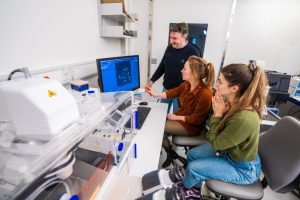Using patient-derived intestinal organoids for cystic fibrosis diagnosis, personalized medicine and fundamental academic research questions
In our research, we use patient-derived intestinal organoids (PDIOs) as a powerful platform to study cystic fibrosis (CF). These organoids retain the genetic background of the individual, enabling us to investigate disease mechanisms, evaluate potential therapies, and support personalized treatment strategies. Using functional assays like the forskolin-induced swelling (FIS) assay, we assess CFTR function across a range of mutations and treatment conditions. Our work spans from diagnostics and drug screening to academic research into therapeutic approaches for challenging mutations—including nonsense mutations—and novel strategies such as gene editing. By bridging preclinical research with clinical relevance, our aim is to contribute to precision medicine and improve treatment options for all people with CF.

Personalized medicine for CF: matching which therapeutic regimens is effective for which CFTR genotypes and persons with CF, using patient-derived intestinal organoids (PDIOs) in functional assays. Whilst this model has proven already highly valuable, we continue with further optimizations, including:
For ultimate preclinical-clinical collaboration, we interact with clinicians Kors van der Ent & Karin de Winter – de Groot at Pediatric Pulmonology.
Addressing academic questions using PDIOs, ranging from characterization of novel treatment regimens (small-molecule based or gene therapy based) or more fundamental questions about CFTR biology. Examples:
We are always open to collaborate with academic and biotech researchers. Feel free to Sacha (contact details down below).
Senior technician
PhD student
Technician
PhD student
PhD student
